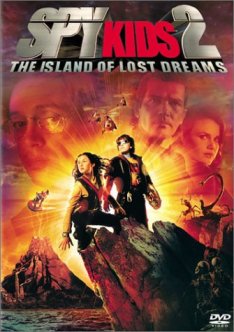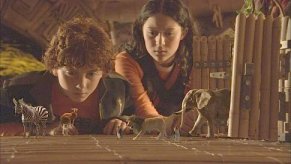previews
of upcoming Disney projects
Tech
Specs: Widescreen anamorphic, aspect ratio 1.66:1, Dolby
stereo, close-captioned
Anybody
who has read this site for a while knows that we have a
healthy respect for Robert Rodriguez, and the Spy Kids
franchise in particular. Film writer Jordan Rosa already
raved about the second installment in his
review last summer.
Rodriguez
has an almost unique ability to bring his personal vision
to the screen. It helps when you serve as your own writer,
director, editor, production designer, effects guru, and
even music composer. If you're a fan, too, the DVD of Spy
Kids 2: The Island of Lost Dreams is a double-treat.
Not
only does the disc boast a good (admittedly, not fantastic)
transfer of the film, but it's loaded with a balance of
extras for the kids and for the budding filmmaker.
Even if the film doesn't quite float your boat, Rodriguez
has a lot of useful advice about how to make your own movie
without big studio backing. (Though Spy Kids 2 did
have studio backing, he still pulled it off for less than
the cost of the first film, and under $40 million -- at
his own request.)
The
director/polymorph claims, in fact, that this film was the
most fun he'd had since El Mariachi, his infamous
$7,000 debut.
For
me, this is the first director commentary that I've ever
listened to that I want to sit through again. A whirlwind,
Rodriguez hardly pauses for a breath in his eagerness to
talk about his film. He does, however, pause the commentary
track (not that you'd notice) in order to find some sound
clips of early stages of his music.
What
makes it so interesting is that he's not so interested in
telling you about his creation as he is how you might unlock
your own creativity. Sure, he has to offer examples from
his own life, but listening to this lecture (and it is more
lecture than commentary), a lot of advice hits home.
Through
the process of trying to create this series from a kid's
point of view, Rodriguez learned to stop himself from stopping
himself. In the most cogent example, he points out that
if you ask a kid to compose an opera, she won't tell you
that she can't. Instead, she'll just go ahead and compose
an opera. (Whether it's any good or not is beside the point.)
And so, Rodriguez became a composer.
The
key is a willingness to be creative. Learning how to edit,
to design, etc., ends up playing second fiddle, as long
as you're willing to do whatever the task is. Rodriguez
makes a pretty good case for doing it yourself, too, which
probably annoys a lot of studios.
As
a supplement, he includes a video feature, the Ten Minute
Film School. (Is this de rigeur for his discs?) That
feature underscores a lot of the points he makes in his
commentary, with great visual examples.
Diving
into the rest of the behind-the-scenes featurettes illustrates
that despite Rodriguez' ultimate auteur position,
work on his films is truly collaborative. He allows both
actors and crew to play to their strengths, and if there
isn't room for it, he'll make room. (Hence Juni's penchant
for ballet.)
It's
the extras from the studio that don't measure up. Once again,
we get a "set top game" that's just a set of trivia questions
based on the movie, without any real interactivity. Strangely
enough, last week's release of Belle's Magical World
offered more variety in exploring what a DVD can do.
But
that's a minor quibble. Though I'm not quite as enamored
of the film as Jordan was, the DVD of Spy Kids 2
ended up being surprisingly rejuvenating. After watching
it, you won't be saying "I can do that!" so much as "heck,
I can do something -- and should."
Spy Kids 2: The Island of Lost Dreams







